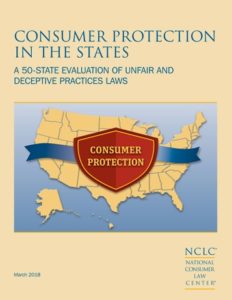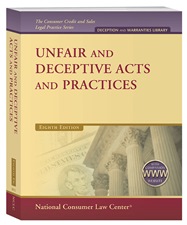This National Consumer Law Center survey updates our 2009 analysis of the strengths and weaknesses of the laws in each state and the District of Columbia that prohibit deceptive and unfair practices in consumer transactions, such as sales of cars and other goods, loans, home improvements, and mortgage transactions. NCLC finds both gains and losses for consumers, and every state has room for improvement.
 Published: March 2018 Published: March 2018 |
Report (PDF) Executive Summary Key Recommendations Maps (PDF) Chart: At a Glance State by State UDAP Statutes’ Strengths and WeaknessesAppendices (PDF)
|
Additional Resource: A 50-State Report on Unfair and Deceptive Acts and Practices Statutes, Feb. 2009
Executive Summary
Unfair and Deceptive Acts and Practices (UDAP) laws should be the backbone of consumer protection in every state. Yet in many states these statutes fall far short of their goal of deterring and remedying a broad range of predatory, deceptive, and unscrupulous business practices.
This report evaluates the strength of each state’s UDAP statute, and documents how significant gaps or weaknesses in almost all states undermine the promise of UDAP protections for consumers.
UDAP laws prohibit deceptive practices in consumer transactions and, in many states, also prohibit unfair or unconscionable practices. But their effectiveness varies widely from state to state.
In many states, the deficiencies are glaring. Legislation or court decisions in dozens of states have narrowed the scope of UDAP laws or granted sweeping exemptions to entire industries. Other states have placed substantial legal obstacles in the path of officials charged with UDAP enforcement, or imposed ceilings as low as $1,000 on civil penalties. And several states have stacked the financial deck against consumers who go to court to enforce the law themselves.
Key Findings
UDAP protections in Michigan and Rhode Island—the “terrible two”—have been gutted by court decisions that interpret the statute as being applicable to almost no consumer transactions. These decisions were issued over ten years ago, yet the state legislatures still have not corrected them.
In addition to Michigan and Rhode Island, seven states—Alabama, Florida, Louisiana, Nebraska, New Hampshire, Ohio, and Virginia—exempt most lenders and creditors from UDAP statutes, while another 14 leave significant gaps or ambiguities in their coverage of creditors.
Utility companies in 14 states enjoy immunity from UDAP laws, as do insurance companies in 21 states.
Nine states—Indiana, Iowa, Kentucky, Mississippi, New York, Oregon, Tennessee, Texas, and Wisconsin—prevent consumers from enforcing certain key prohibitions in the statute, or enforcing it against certain businesses such as lenders, insurance companies, or sellers of real estate.
Broad, flexible prohibitions of unfair and deceptive practices are the hallmark of UDAP laws. Yet Colorado and Oregon do not include a broad prohibition of deceptive practices, South Dakota’s prohibition is burdened by a requirement to show knowledge and intent, and the broad prohibition of deception in the Mississippi, Tennessee, and Texas laws cannot be enforced by consumers. In addition, Oregon, Colorado, Delaware, Minnesota, Nevada, South Dakota, and Virginia do not include a broad prohibition of unfairness, and Mississippi, New York, Oregon, Tennessee, and Wisconsin do not include a broad prohibition of unfairness that consumers can enforce. Only about half the states give a state agency the authority to adopt rules prohibiting
emerging forms of deception or unfairness.
While all states allow consumers to go to court to enforce UDAP laws, Iowa and Mississippi provide the weakest overall remedies for consumers of all the states. In addition, five states—Arizona, Delaware, Mississippi, South Dakota, and Wyoming — impose a financial burden on consumers by denying them the ability to recover their attorney’s fees, so even a consumer who wins a case is not made whole. Worse, two states—Alaska and Florida—deter victims of fraud from going to court by requiring unsuccessful plaintiffs to pay the business’s attorney fees even if the case was filed in good faith. As a result, a consumer who brings a UDAP claim in good faith, even for a relatively small amount of money, can be hit with tens of thousands of dollars in the business’s attorney fees.
Three states—Colorado, Nevada, and Wyoming—impede the Attorney General’s ability to stop unfair or deceptive practices by conditioning any state enforcement action on proof that those practices were done knowingly or intentionally.
A number of states impose special procedural obstacles on consumers that can hinder or even prevent them from enforcing the UDAP statute. Ten states—Alabama, California, Georgia, Indiana, Maine, Massachusetts, Mississippi, Texas, West Virginia, and Wyoming—require a consumer to give a special advance notice to the business or impose an equivalent pre-suit requirement, and California and Florida impose this requirement in some circumstances. Seven states—Colorado, Georgia, Minnesota, Nebraska, New York, South Carolina, and Washington—require consumers to prove not just that they were cheated, but that the business cheats consumers frequently or as a general rule, a complicated requirement that can force a consumer who was cheated to foot the bill for an expensive investigation. Twenty-one states deny a consumer who has suffered an intangible injury such as invasion of privacy the right to bring suit under the UDAP statute.
Most states allow a civil penalty, ranging from $1,000 to $50,000, to be imposed on a business that violates the UDAP statute. Rhode Island is the only state in the nation that does not provide a civil penalty for initial violations. Five jurisdictions—the District of Columbia, Maryland, Missouri, Pennsylvania, and Tennessee—provide for civil penalties of just $1,000 for initial violations.
On the other hand, some states have avoided most of these weaknesses. For example, Hawaii’s UDAP statute has strong prohibitions and strong provisions for enforcement both by the state and by consumers, and no carve-outs for major industries. The Massachusetts statute shares these same strengths, although it is marred by imposing the procedural obstacle of advance notice before a consumer can proceed against a business – a technical requirement that can result in dismissal of meritorious claims. Connecticut’s and Vermont’s statutes also share these strengths for the most part, except for a lack of clarity about their statutes’ application to insurance transactions. The Illinois statute is also strong, except for court decisions that cloud its application to credit transactions and to persons who profit from others’ unfair and deceptive tactics. Although even these states’ UDAP statutes can be improved, they stand as examples to the rest of the country of how to strengthen state-level consumer protection.
Alaska, Arizona, Delaware, Iowa, North Dakota, and Oregon have made significant improvements to their UDAP statutes since 2009. Tennessee and Ohio went in the opposite direction, weakening their UDAP statutes in significant ways. Arkansas enacted a set of amendments in 2017 that both improve its UDAP statute in some ways and weaken it in others.
Key Recommendations
States that want to strengthen their protections for consumers should:
Strengthen their UDAP statute’s substantive prohibitions by:
- Making sure that the statute includes broad prohibitions of deceptive and unfair acts.
- Removing any provisions that prevent consumers from enforcing these broad prohibitions.
- Making sure that a state agency has the authority to adopt rules that specify particular practices as unfair or deceptive.
Strengthen their UDAP statute’s scope by:
- Narrowing or deleting any exclusion for regulated industries, so that is clear that the mere fact of regulation is not a license to engage in unfair and deceptive practices.
- Eliminating exemptions for lenders, other creditors, insurers, and utility companies.
- Making it clear that the statute applies to real estate transactions and to post transaction matters such as abusive collection of consumer debts.
Strengthen the state’s ability to enforce the statute by:
- Deleting any requirement that knowledge or intent be proven as an element of a UDAP violation.
- Increasing the size of the civil penalty and making sure that it is applicable per violation.
- Giving the enforcement agency a full range of pre-suit investigatory power.
- Allowing courts to order a business to pay the state’s attorney fees and costs when the state prevails in a UDAP case.
- Providing adequate funding for the consumer protection activities of the state agency.
Strengthen consumers’ access to justice by:
- Removing any gaps in consumers’ ability to enforce the statute.
- Making it clear that courts can order a business to pay a consumer’s attorney fees, and that the consumer cannot be held responsible for the business’s attorney fees if the case was filed in good faith.
- Removing any restrictions on UDAP class actions, so that they are governed by the state’s usual rules (or by the federal rules if the case is filed in federal court).
- Deleting any special barriers imposed on consumers before they can invoke a statute’s remedies, such as a special advance notice requirement, a requirement that a consumer who has been cheated prove that the business cheats consumers as a general rule, or a rule that denies consumers who have suffered an invasion of privacy or some other non-monetary injury the ability to enforce the statute.
- Amending the statute to make it clear that courts can presume that consumers relied on material misrepresentations, without requiring individual proof.
- Allowing consumers to seek enhanced damages or punitive damages in appropriate cases.
Even if a UDAP statute is already free from these weaknesses, it can often be improved by:
- Making it clear that consumers can obtain equitable relief, such as an injunction to stop a practice.
- Making attorney fee awards to consumers mandatory, so that if they prevail they are assured of being made whole.
- Adding a provision for a small statutory damages award whenever a consumer proves a violation of the UDAP statute.
- Making it clear that consumers can prove a UDAP claim by the normal preponderance of the evidence standard.
- Making it clear that the heightened requirements of common fraud and rigid contract law rules are not applicable to UDAP claims
 |
A thorough discussion of all the issues addressed in this report may be found in the National Consumer Law Center’s publication Unfair and Deceptive Acts and Practices. |
